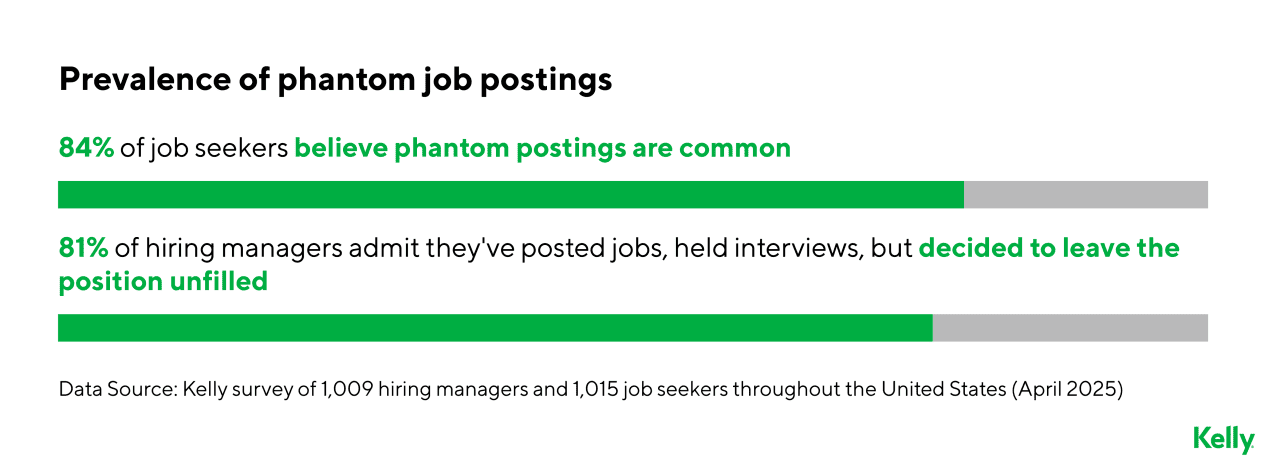Job seekers say hiring feels rigged — and employers agree

Pheelings media // Shutterstock
Job seekers say hiring feels rigged — and employers agree
In today’s job market, pursuing the next step can feel less like finding the right fit and growing your career, and more like rolling the dice or playing poker. Candidates bluff with polished resumes, employers test the market with jobs they may not fill and both sides keep cards close to the vest. A new survey from Kelly reveals how much hiring plays out this way.
The report, based on responses from more than 2,000 people, including 1,015 job seekers and 1,009 hiring managers across the United States, captures the strategies both sides bring to the hiring process.
Candidates apply for roles where they fall short of listed qualifications, while managers post jobs they never intend to fill. Both sides are using new tools, including artificial intelligence, to play the hiring game.
The result is a process that often feels less about transparency and more about unspoken rules and hidden dynamics.
Where job seekers and managers agree — on AI and more
Despite frequent miscommunication, the survey found job seekers and hiring managers agree on some parts of the process. One of those areas is timing. Just over half of candidates and managers say three days is the right amount of time to decide on a job offer, long enough to review details, discuss with family or weigh other options, but quick enough to show genuine interest.
Another point of agreement is on artificial intelligence. Sixty-three percent of job seekers say it is ethical to use AI to improve resumes or applications, and 67 percent of hiring managers agree. Many of those same managers also use AI detection tools to screen applications.
Jobs where applicants do not meet every listed qualification, known as stretch applications, are another example of shared understanding. Nearly all job seekers, 96 percent, say they apply for these jobs anyway, and three out of four hiring managers say that is acceptable. Job requirements are viewed less as deal breakers and more as wish lists. More than a third of candidates who apply this way say they can quickly learn the missing skills once hired.

Kelly
What phantom jobs reveal
The survey also shows why job seekers often feel misled.
Many candidates describe spending hours applying for roles and moving through interview rounds only to learn the position was never meant to be filled. Survey data confirms this is common.
Eighty-four percent of job seekers say they believe phantom postings are common. Among hiring managers, 81 percent admit they have posted jobs, conducted interviews and then decided to leave the position unfilled. Nearly one in three say they use the tactic frequently. The top reasons companies do this are building a pipeline for future roles and gathering industry insights.

Kelly
When pay ranges are missing
The survey shows salary disclosure continues to be a sticking point in hiring. Most job seekers, 68 percent, say they want salary information posted in job descriptions. Less than half of hiring managers, 48 percent, say their companies provide this information in the job description from the start.
For candidates, missing or unreliable information can mean wasted time if an offer ends up far below expectations. For employers, holding back details may attract more applicants at first but risks losing them later in the process.
Even when pay ranges are listed, skepticism remains. Only 37 percent of men say they fully believe the numbers, compared with 27 percent of women. Younger workers are more likely to trust them, with 40 percent of Gen Z saying they believe the ranges, compared with 33 percent of millennials and 30 percent of Gen X

Kelly
When remote work is oversold
Few issues generate more tension than remote work. More than half of hiring managers, 54 percent, admit they have made work-from-home policies sound more flexible than they are.
Candidates notice the difference. Seventy-six percent say the reality did not match what was advertised. Some recall jobs labeled remote that still required office attendance. Others claim company policies were unclear or changed.
Managers give several reasons: 47 percent of managers who admit to misrepresenting remote work availability say they wanted to present the company favorably, 48 percent believe candidates will accept stricter conditions once hired and 43 percent are trying to attract top talent.
For job seekers, the result is confusion and disappointment. For employers, it is a risk that employees will disengage or leave quickly once the reality becomes clear.
When benefits and growth get overlooked
Candidates say what a job pays and where they work is only part of the story. Benefits and growth opportunities matter too, but those details are often missing from hiring conversations.
Job seekers point to basics like health coverage, retirement plans and paid leave, along with newer perks like flexible schedules or wellness support. Many also want to know how a role sets them up for the future, whether through training, mentorship or a clear path to promotion.
The survey shows those questions often go unanswered. Only one in three job seekers say they are given upfront details on benefits, and hiring managers largely confirm that. Career growth follows a similar pattern. While 77 percent of candidates say companies clearly outline advancement opportunities in interviews, just 46 percent of hiring managers say they always do.
As a result, applicants often leave interviews without knowing what support or advancement opportunities are really on the table, and employers lose a chance to connect with people motivated by development and long-term growth.
Why honesty matters
The research suggests that transparency may be the one strategy that benefits both sides. Candidates say they value roles where expectations match the posting, and managers say clear conversations about pay and flexibility make it easier to secure committed hires. The survey indicates that when companies provide straightforward details about roles, compensation and work arrangements upfront, they are more likely to attract applicants who are both interested and prepared to succeed.
This story was produced by Kelly and reviewed and distributed by Stacker.
![]()



